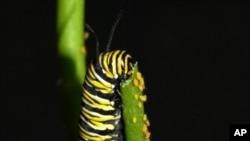Self-medication in the animal kingdom may be even more widespread than previously thought, according to a new study of butterflies which could provide clues for developing chemical compounds for human drugs.
Monarch butterflies protect themselves by what they eat. According to the study in the journal Ecology Letters, not only are their brillant orange and black colors a warning sign to predators, but the milkweed they consume on their long migratory journey between Canada and Mexico is poisonous to the birds, spiders, frogs and bats that could do them harm.
Chemicals called cardenolides in milkweed build up in monarch tissues and provide a natural defense at various stages of butterfly development.
Evolutionary biologist Jaap de Roode studies monarchs at Emory University in Atlanta, Georgia and is lead author of the study. In laboratory experiments, De Roode observed that parasite-infected adult females prefer to lay their eggs on milkweed with higher levels of cardenolides that provide better natural resistance against disease.
"This milkweed seems to be able to reduce the infection success of the parasite as well as reduce the growth rate of the parasites," he says. "The monarchs feeding on it will get a lot less sick than the monarchs feeding on [another] species of milkweed that does not contain these chemicals."
De Roode says that non-infected adults don't seem to have a preference where they lay their eggs. "So somehow they know that they are infected and they know what to do about it."
De Roode says while his data was gathered in a controlled lab experiment, monarchs make the same food choices in the natural world. "What we're finding here is really that these monarchs have evolved a way to medicate their offspring against their parasites."
Researchers have found that many animals - from apes to elephants to sheep - use plants, clay and even insects to deal with injury, infection and parasites.




